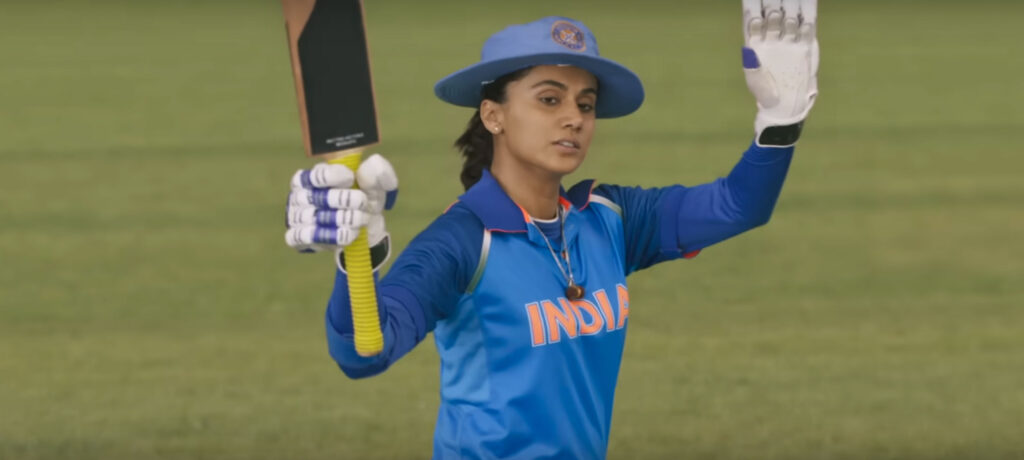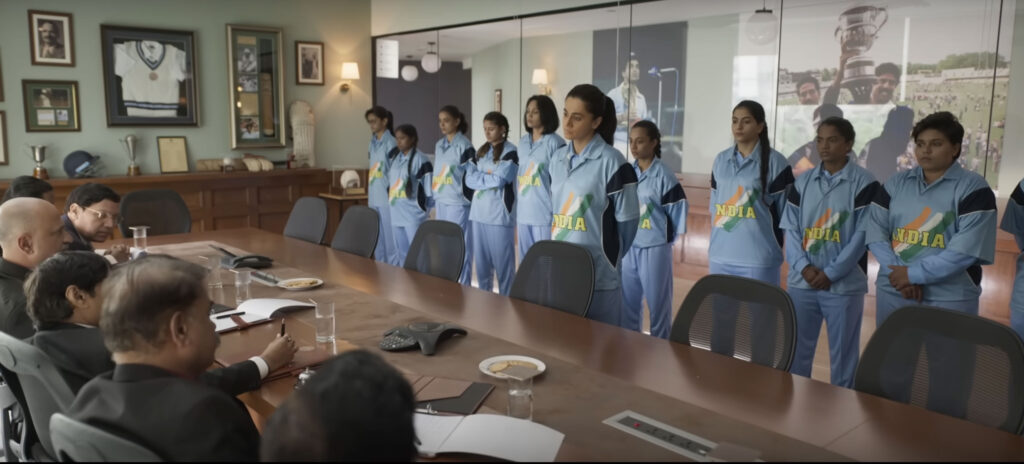August 8, 2022
by Carla Hay

Directed by Srijit Mukherji
Hindi with subtitles
Culture Representation: Taking place in India and other parts of the world, from 1990 to 2017, the dramatic film “Shabaash Mithu” features a predominantly Indian cast of characters (with a few white people) representing the working-class, middle-class and wealthy, in this biopic of cricket star Mithali Raj.
Culture Clash: Mithali Raj faces sexism and other obstacles in her quest to become a professional cricket player.
Culture Audience: “Shabaash Mithu” will appeal primarily to people who are fans of Mithali Raj and movie star Taapsee Pannu, but even those fans might be disappointed at the heavy-handed way that this true story is told.

It’s rare to have theatrically released biopics about Indian women who are sports pioneers, so it’s a shame that “Shabaash Mithu” terribly bungles the true story of cricket star Mithali Raj. The film is bloated and sappy, with bad acting and sloppy editing. And, at an overly long 156 minutes, “Shabaash Mithu” will test the patience of anyone expecting to see an inspirational story told in an engaging way.
Directed by Srijit Mukherji and written by Priya Aven, “Shabaash Mithu” takes place from 1990 to 2017. The movie drags on for so long, viewers will feel like they’ve aged along with the characters in the movie. One of the biggest flaws in “Shabaash Mithu” is that it takes too long in showing Raj’s childhood and repeating how she was underestimated as a cricket player (even by her family), simply because she was a girl. (“Shabaash Mithu” translates to “well done, sweet” in Gujarati.)
“Shabaash Mithu” opens in 1990, with a confusing creative choice by not showing Mithali but showing the girl who would become her best friend: Noorie (played by Kasturi Jagnam), who’s 8 years old in 1990, and who is the same age as Mithali. The movie’s opening scene is of Noorie playing soccer with some neighborhood boys. Her mother then lectures Noorie to look and act more like a girl.
Viewers then see that Noorie has a best friend named Mithali Raj (played by Inayat Verma), nicknamed Mithu. Mithali’s brother Mithun Raj (played by Nishant Pradhan), who’s about 11 or 12 years old, plays cricket. And it isn’t long before Noorie and Mithali want to play cricket with the boys. The girls are predictably taunted and shunned by the boys for wanting to be part of these cricket games.
Noorie is very outspoken, sassy, and can give as much trouble as she gets. When one of the boys is rude to her, she calls him “fatso,” and then she gets into a brawl with him and some of the other boys. Mithali is more hesitant and reserved, but she also feels like she has just as much of a right as the boys have a right to learn how to play cricket. Mithali keeps her cricket playing a secret from her family, because she knows they think playing cricket should only be for boys and men.
Mithali and her brother live with their mother Leela Raj (played by Devadarshini), father Dorai Raj (played Sameer Dharmadhikari), and paternal grandmother. These family members think that Mithun is the going to be the one in the family who could become a sports star. They’re in for a shock when they’re visited by a cricket coach named Sampath (played by Vijay Raaz), who says that he’s been watching Mithali play cricket, and he’s interested in having Mithali (not Mithun) train at the Reyes Cricket Academy for children.
Older brother Mithun is jealous and a little embarrassed that he wasn’t chosen for this well-known academy. Mithali’s parents and grandmother are skeptical that Mithali has what it takes to be a cricket star. After quite a bit of pleading, Coach Sampath convinces the family members to let Mithali join the Reyes Cricket Academy, where Noorie has also been accepted as a student. At Noorie’s suggestion, Mithali eventually cuts off her long braids so that her hair won’t get in the way of her cricket playing.
This part of Mithali’s childhood should have been covered in 10 minutes or less in the movie, but it drags out with scenes that take up about 30 minutes of the film. The movie then fast-forwards to 1997, where Mithali (played by Taapsee Pannu) and Noorie (played by Anushree Kushwaha) are 15 years old and still being coached by Sampath at the Reyes Cricket Academy. Both girls plan to eventually become professional cricket players.
Noorie and Mithali are still the best of friends, but their friendship is changed forever when 15-year-old Noorie announces that she’s getting married because Noorie’s father has arranged for her to get married. Therefore, Noorie has to quit the academy and quit cricket completely. Mithali is devastated and feels abandoned by Noorie, who was the person who got Mithali interested in cricket in the first place.
Mithali then gets selected for a national cricket camp for the women’s national cricket team of India. And once again, her brother Mithun is jealous. At the Women’s Cricket Board, Mithali is immediately hazed and bullied by the other team members because she’s a shy newcomer. In one such incident, Mithali becomes a target for bullying just because she asked for pain medication for menstrual cramps.
Mithali often gets dejected and sometimes feels like giving up, but Sampath advises her not to quit and to use her emotional pain as her strength in cricket games. He also tells her that many of the other women on the team come from backgrounds of hardship and that they use these feelings of anger and bitterness in their energy for the games against the opponents. Viewers won’t learn much about cricket playing skills, unless you think it’s fascinating when Sampath utters this trite advice to Mitahli in a “mind over matter” pep talk: “The most important position in batting is in your head.”
People who know about the real Mithali’s life story might already know that Sampath won’t always be there for Mithali as her mentor. When Mitahli founds out that Sampath will no longer be in her life, the expected melodrama ensues. Mithali is able to eventually win over her teammates when she’s suddenly named team captain in a very phony-looking scene.
One of the biggest problems with “Shabaash Mithu” is how it keeps repeating scenarios, long after the point was made the first time this scenario was shown. In addition to the long stretches of the movie showing Mithali getting bullied by her teammates (before she gets their respect), “Shabaash Mithu” overloads on repetition in showing how the men’s national cricket team of India has more fame and fortune than the women’s national cricket team of India. It doesn’t help that the women’s team is on a losing streak until Mitahli becomes the team captain.
“Shabaash Mithu” has too many similar scenes of the women’s team being ignored and disrespected at airports and other public places, while members of the men team (who just happen to be nearby) are cheered and celebrated. Mithali and her team are so disrespected, Indian cricket officals decide that the women’s team will have to wear discarded uniforms that were formerly worn by the men’s team, with the men’s last names still on the back of the shirts. It’s at this point in the movie that you know the women’s team will collectively rip off those shirts in a show of defiance and female pride.
There’s a lot of heavy-handed footage of Mithali being a women’s rights crusader and doing things like marching into offices and demanding to be respected by an all-male team of decision makers. All of these scenes are so hokey, but the awful dialogue and hammy acting just make it all worse. And so much of the movie just drags on and on and on, because the editing is so horrible. “Shabaash Mithu” is a pile-on of corny clichés with no self-awareness of how dreadful everything is and how disrespectful it is to the real Mithali Raj, who surely was not this vapidly dull in real life.
And where does this leave all the cricket playing? In “Shabaash Mithu,” the games are choppily edited to the point where it’s obvious that the actors don’t have real cricket skills. It isn’t until the last third of the film, which shows the 2017 Women’s World Cup finals, where the energy picks up to where it should have been all along in showing these cricket matches. But by then, it’s too little, too late. A lot of people who have the endurance to watch this long-winded mess until the very end will have emotionally checked out by then.
Viacom18 Studios released “Shabaash Mithu” in select U.S. cinemas and in India on July 15, 2022.


